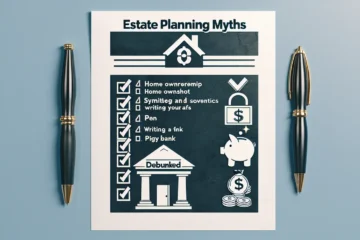Estate planning can seem overwhelming, but having a clear plan for your assets and future is important. Understanding the role of a lawyer in this process can make things much easier and ensure that your wishes are legally protected.
What is Estate Planning?
Estate planning involves organizing your assets and responsibilities in preparation for the end of life. It includes the writing of wills, establishing trusts, and planning for taxes and medical directives. This process is essential to ensure your wishes are respected and your loved ones are taken care of.
Beyond merely dividing assets, estate planning takes into account your healthcare preferences and assigns power of attorney to a trusted individual. This comprehensive approach ensures that your personal beliefs and financial decisions are upheld even when you’re unable to voice them yourself.
Without an effective estate plan, your loved ones may face legal challenges and financial uncertainties. Developing a thorough estate plan with professional help ensures a smoother process and peace of mind for all involved.
Why Do You Need a Lawyer for Estate Planning?
While you can draft your documents without a lawyer, having one ensures that your plans adhere to state laws and are legally binding. Lawyers provide guidance, minimize potential disputes, and ensure your estate planning documents are executed correctly.
Working with a lawyer offers the advantage of personalized advice tailored to your unique circumstances. They can help avoid common pitfalls, such as improperly signed documents, that might otherwise render your will or trust invalid.
A lawyer’s role is vital in ensuring that all aspects of your estate plan are cohesive and aligned with your wishes and legal requirements. Without expert guidance, your estate could be subject to higher taxes or lengthy probate proceedings.
Discover how estate planning can safeguard your assets efficiently by exploring our insightful resources.
How Can a Lawyer Help with Wills and Trusts?
Lawyers have the expertise to draft wills and establish trusts that accurately reflect your intentions. They can offer strategies to reduce estate taxes and avoid probate, making it easier and quicker for your beneficiaries to receive their inheritance.
In addition to preparing legal documents, lawyers play a crucial role in maintaining their validity. They ensure that wills and trusts are updated regularly to reflect any life changes or new family dynamics.
For families with complex relationships, trusts can be a valuable tool. Lawyers can advise on the best type of trust to use, whether it’s revocable, irrevocable, or tailored to specific needs like education or healthcare.
To learn more about simplifying property transfers, read our blog on estate planning strategies.
What Role Does a Lawyer Play in Tax Planning?
A lawyer can help you navigate complex tax laws and develop strategies to minimize estate taxes. They ensure your assets are distributed in tax-efficient ways, maximizing the inheritance received by your beneficiaries.
Lawyers are adept at identifying opportunities to use trusts, gifting, and donations as mechanisms to reduce an estate’s taxable value. These strategies help retain wealth within the family while adhering to legal standards.
Strategic tax planning involves not only lowering current liabilities but also forecasting future financial needs. With professional guidance, your estate plan can be adjusted to optimize for both present and future tax situations.
For a deeper understanding, explore why hiring an estate planning lawyer is crucial.
How Can a Lawyer Assist with Healthcare Directives and Power of Attorney?
Lawyers can help you set up documents like advance healthcare directives or durable power of attorney, which dictate your wishes for medical treatment and designate someone to make financial or healthcare decisions on your behalf if you become incapacitated.
These directives prevent family disputes and ensure your medical preferences are respected. By detailing your choices clearly, you spare loved ones from making difficult decisions during emotionally challenging times.
Establishing a durable power of attorney gives someone you trust the authority to manage your financial matters, ensuring that bills are paid, investments are managed, and any legal requirements are met.
Choosing the Right Lawyer for Your Estate Planning
Choosing a lawyer specializing in estate planning is crucial. Look for experience, credentials, and someone who communicates clearly and understands your personal circumstances. This ensures you receive personalized advice tailored to your needs.
An essential aspect is compatibility, as the estate planning process involves discussing sensitive topics. You should feel comfortable sharing personal details with your attorney.
In addition to technical abilities, consider a lawyer’s approachability and willingness to listen. These qualities ensure that the advice they provide is not only legally sound but genuinely reflective of your goals and concerns.
For more detailed articles on estate planning, visit our comprehensive blog.
Why a Lawyer is Essential in Estate Planning
Engaging a lawyer in the estate planning process can make a significant difference in ensuring your wishes are honored and that your loved ones are provided for. With their expertise, you can navigate legal complexities with confidence, knowing that your estate is in good hands.




0 Comments